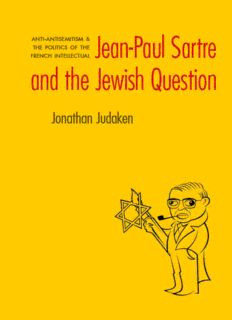
Jean-Paul Sartre and The Jewish Question: Anti-antisemitism and the Politics of the French Intellectual (Texts and Contexts) PDF
Preview Jean-Paul Sartre and The Jewish Question: Anti-antisemitism and the Politics of the French Intellectual (Texts and Contexts)
Jean-Paul Sartre and the Jewish Question Texts and Contexts general editor Sander L. Gilman University of Illinois, Chicago editorial board David Bathrick Cornell University J. Edward Chamberlin University of Toronto Michael Fried The Johns Hopkins University Robert Nye Oregon State University Nancy Leys Stepan Wellcome Unit History of Medicine, Oxford University Jean-Paul Sartre and the Jewish Question Anti-antisemitism and the Politics of the French Intellectual Jonathan Judaken university of nebraska press • lincoln and london Portions of chapter 1 appeared previously as “The Mirror Image and the Politics of Writing: Reflec- tions on ‘the Jew’ in Sartre’s Ear- ly Thought,” Historical Reflections/ Réflexions Historiques 25, no. 1 (Spring 1999): 33–59, and “Nation- alism, Anti-Semitism, and the Pol- itics of Engagement: Sartre’s Early Reflections on ‘the Jewish Ques- tion,’” in Proceedings of the Annu- al Meeting of the Western Society for French History: Selected Papers of the Annual Meeting, volume 24, edited by Barry Rothaus (Greeley: Uni- versity Press of Colorado, 2004). Portions of chapter 6 appeared pre- viously as “Sartre at 100: Revisit- ing His Interventions in the Arab- © 2006 by the Board of Regents Israeli Conflict,” in Antisemitism of the University of Nebraska International: An Annual Research All rights reserved Journal of the Vidal Sassoon Interna- Manufactured in the United tional Center for the Study of Anti- States of America semitism at the Hebrew University of Jerusalem [forthcoming], and Library of Congress Cataloging- “Sartre, Israël et la politique de in-Publication Data l’intellectuel,” La Règle du Jeu, no. Judaken, Jonathan, 1968– 27 (January 2005): 152–65. Portions Jean-Paul Sartre and the Jewish of chapter 7 appeared previously as question : anti-antisemitism and “May ’68: The Jewish Sub-Text,” in the politics of the French intel- Proceedings of the Annual Meeting of lectual / Jonathan Judaken. the Western Society for French History: p. cm.—(Texts and contexts) Selected Papers of the Annual Meeting, Includes bibliographical refer- volume 30, edited by Barry Rothaus ences and index. (Greeley: University Press of Colo- isbn-13: 978-0-8032-2612-8 rado, 2004), and “Beauvoir’s Blues, (cloth : alk. paper) Sartre’s Jews: Reading L’Espoir main- isbn-10: 0-8032-2612-8 (cloth : tanant,” JRS 6, no.1–2 (2006): 169– alk. paper) 183. Portions of chapter 8 appeared 1. Sartre, Jean-Paul, 1905–1980. previously as “To Be or Not to Be Reflexions sur la question juive. French: Soixant-huitard Reflec- 2. Sartre, Jean-Paul, 1905–1980— tions on ‘la question juive,’”Journal Criticism and interpretation. of Modern Jewish Studies 1, no. 1 (April 3. Jews—France—Identity. 2002): 3–21. I. Title. ds145.s273j83 2006 305.892'4044—dc22 2006021996 Set in Quadraat & Quadraat Sans by Kim Essman. Designed by R. W. Boeche To Julia in the hope of provoking future Jewish questions Contents Acknowledgments ix Introduction French Intellectuals and the Jewish Question 1 1. The Mirror Image and the Politics of Writing Sartre's Early Reflections on the Jewish Question 23 2. Sartre's Useless Passion Writing under the German Occupation 49 3. Sartre's Postwar Témoignage Résistancialismeand the Double Strategy of Forgetting 106 4. Bearing Witness to the Victims of History Sartre’s Réflexions sur la question juive 123 5. Sartre’s Passion Engagementand the Project of Universal Emancipation 147 6. On Ambivalent Commitments Sartre, Israel, and the Politics of the Intellectual 184 7. Sartre’s Final Reflections Intellectual Politics and the Jewish Question 208 8. The Eternal Return of Sartre ReadingRéflexions sur la question juivein Postwar France 240 Notes 291 Index 369 Acknowledgments We pretend that we write alone. We sign the text alone and represent its ideas as if they were ours alone, as if it was not through discussion, dialogue, and rela- tionship that thinking and writing happen. This book would not have been pos- sible, however, without the encouragement and support of my family, friends, teachers, and colleagues. It began as a dissertation more than ten years ago at the University of Califor- nia, Irvine, at a time when the Critical Theory Institute and the presence (dare one use the term) of Jacques Derrida and Jean-François Lyotard on the faculty made for an invigorating, intellectually adventurous environment. This was nourished by Mark Poster, my advisor, whose writing on Sartre, poststructural- ism, and French thought after 1945 has clearly shaped my own lines of inquiry. I was fortunate to work with David Carroll, whose rigor, depth, and range as a scholar and whose critical insight and careful reading were exemplary. I am indebted to Daniel Schroeter, whose arrival at uc Irvine helped inspire the turn toward a strict focus on French intellectuals and the Jewish Question and whose Menschlichkeit softened the often-uncomfortable process of completing a dissertation. Without Daniel I never would have made it to Hebrew University, and for that I am eternally grateful. My two years there as a postdoctoral fellow were Edenic. I learned to value erudition as much as critical theory. I studied at the feet of scholars (many of whom I will not have the space to mention here) who have shaped so much of what we understand about the history of Jews and Judaism. As importantly, I came to understand the fecundity of intellectual community. Ezra Mendelsohn, whom I was lucky enough to have as a neighbor and who also served as the head of the Institute of Contemporary Jewry, which was my aca- demic base station, imparted the wisdom that came from a sweet and sardonic 6
Description: